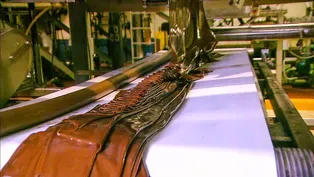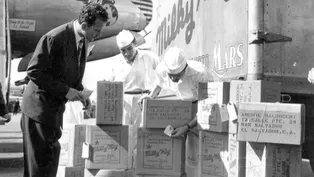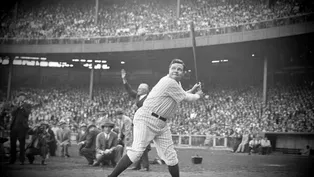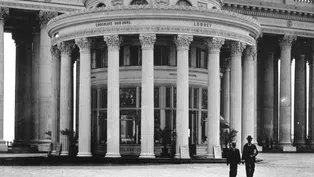Chicago Stories
Wrigley’s Gum
Clip: 10/27/2023 | 4m 13sVideo has Closed Captions
William Wrigley never intended to make his fortune in candy.
Thanks to some trial and error with baking soda and other products, William Wrigley accidentally found his fortune in gum.
Problems with Closed Captions? Closed Captioning Feedback
Problems with Closed Captions? Closed Captioning Feedback
Chicago Stories is a local public television program presented by WTTW
Leadership support for CHICAGO STORIES is provided by The Negaunee Foundation. Major support for CHICAGO STORIES is provided by the Elizabeth Morse Genius Charitable Trust, TAWANI Foundation on behalf of...
Chicago Stories
Wrigley’s Gum
Clip: 10/27/2023 | 4m 13sVideo has Closed Captions
Thanks to some trial and error with baking soda and other products, William Wrigley accidentally found his fortune in gum.
Problems with Closed Captions? Closed Captioning Feedback
How to Watch Chicago Stories
Chicago Stories is available to stream on pbs.org and the free PBS App, available on iPhone, Apple TV, Android TV, Android smartphones, Amazon Fire TV, Amazon Fire Tablet, Roku, Samsung Smart TV, and Vizio.
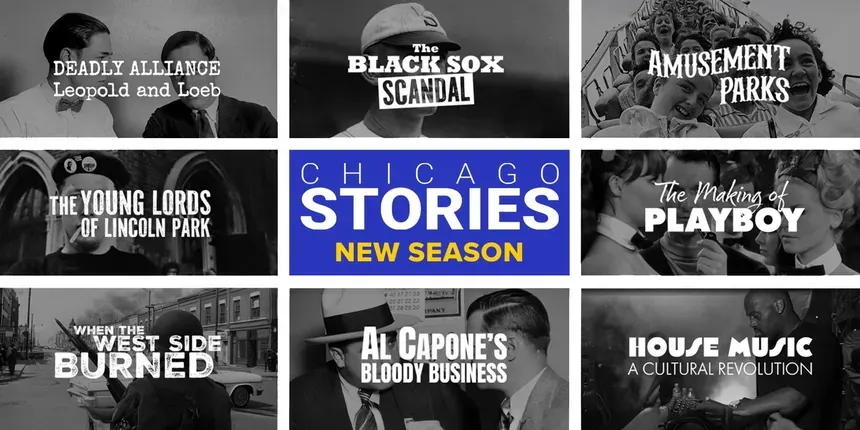
Chicago Stories
WTTW premieres eight new Chicago Stories including Deadly Alliance: Leopold and Loeb, The Black Sox Scandal, Amusement Parks, The Young Lords of Lincoln Park, The Making of Playboy, When the West Side Burned, Al Capone’s Bloody Business, and House Music: A Cultural Revolution.Providing Support for PBS.org
Learn Moreabout PBS online sponsorshipsaw sales climb to more than 65 million dollars a year.
- And so a lot of confectioners realize this can make people rich, this can make people famous.
And so I think it was this tantalizing combination where if you're an entrepreneur and you look at that business, it's pretty seductive.
- [Narrator] And who could resist?
Many attempted to break into the industry, but the candy capital was no place for the timid.
Success there called for a special type of character.
- Candymakers can be so clever, don't always be fooled by the sweet image, right?
There can be a real shrewdness in the candy business.
- [Narrator] And no one understood the potential quite like William Wrigley Jr. A defiant child, Wrigley was kicked out of school at age 11, but soon discovered he had a knack for sales.
- William Wrigley Jr. is one of those great American success stories.
Came to Chicago in the early 1890s, and the legend is he had $32 in his pocket or something, but his father was a soap manufacturer, so he starts going door to door selling soap.
- [Narrator] But the soap wasn't moving.
So the young salesman offered a gimmick, a free can of baking powder with every bar of soap.
- The baking powder became more popular than the soap, so he dropped the soaps, sold baking powder, eventually started offering other premiums, including gum with every order.
- [Narrator] Just like before, the gum outperformed the baking powder.
And voila, the Wrigley empire was born.
- But it's such a perfect example of what William Wrigley did really, really well, which was innovative marketing.
- [Narrator] Wrigley bought out his gum supplier and started developing his own flavors.
First came Juicy Fruit.
Followed by Spearmint.
And eventually Doublemint.
The new brands earned millions.
And the company rallied around Wrigley's marketing motto, "Tell them quick, and tell them often."
- When you look at the Wrigley's ads, he was using bold graphics, bright colors, minimal text.
It was very innovative when a lot of advertisements were very text heavy and told whole stories.
You'll see early Wrigley's ads and they'll say, "It aids your digestion."
I'm not sure we would use that today, but it worked.
And then of course, he had these great stunts.
You know, he one time said he wanted a mile wide Wrigley billboard, so he bought up 117 billboards between Atlantic City and Trenton just for Wrigley's ads.
And mailed a packet of gum or sticks of gum to anyone who had a listing in any 1915 United States telephone directory.
You know, if you can afford a telephone, you can afford gum.
- [Narrator] William Wrigley took his company public and by 1919, the business he had started with a humble pack of gum was worth 12 million dollars, more than 210 million in today's dollars.
Wrigley cemented his place in the Chicago skyline with his iconic headquarters on Michigan Avenue and even bought his own island, Santa Catalina, off the coast of Southern California.
- And then he made a dreadful error.
He bought the Chicago Cubs.
His accountant should have committed him to an insane asylum.
Being a Cubs fan is you have to worship losing.
When you make bucks in America, the next thing you think is, "What am I gonna be remembered for?"
He's got a tower, so he must be something.
Behind the Scenes at the Tootsie Roll Factory
Video has Closed Captions
Explore Chicago’s role as the candy capital and visits the Tootsie Roll factory. (3m 24s)
Video has Closed Captions
The Mars family was behind the biggest candy bars of all time, but it came at a cost. (4m 55s)
Video has Closed Captions
The Curtiss Candy Company had a hit on its hands with Baby Ruth. (2m 21s)
The Sweet Treats of the World’s Fair
Video has Closed Captions
The World’s Fair was behind some well-known sweet treats. (2m 56s)
Providing Support for PBS.org
Learn Moreabout PBS online sponsorshipSupport for PBS provided by:
Chicago Stories is a local public television program presented by WTTW
Leadership support for CHICAGO STORIES is provided by The Negaunee Foundation. Major support for CHICAGO STORIES is provided by the Elizabeth Morse Genius Charitable Trust, TAWANI Foundation on behalf of...
